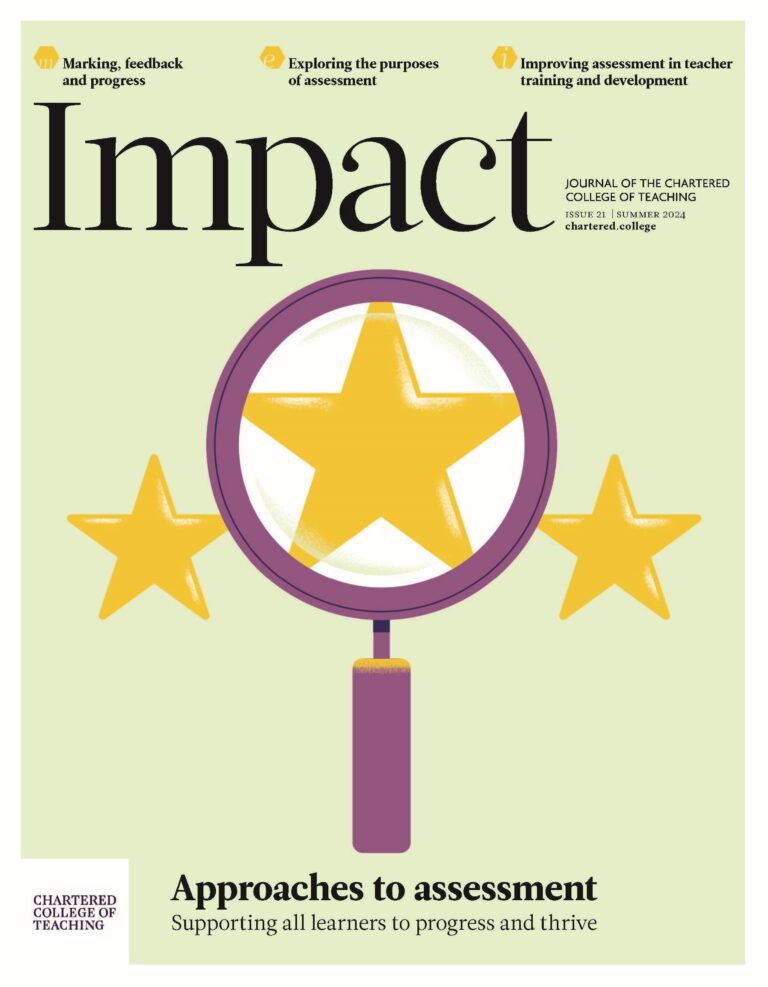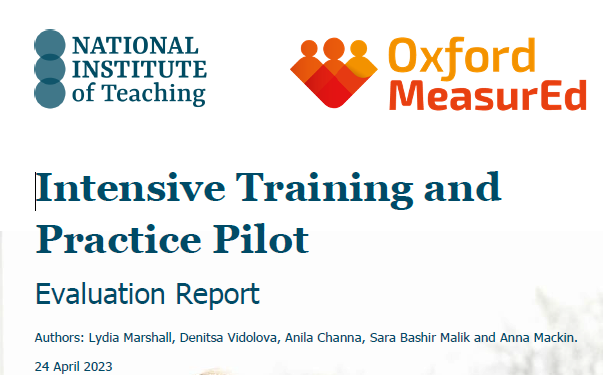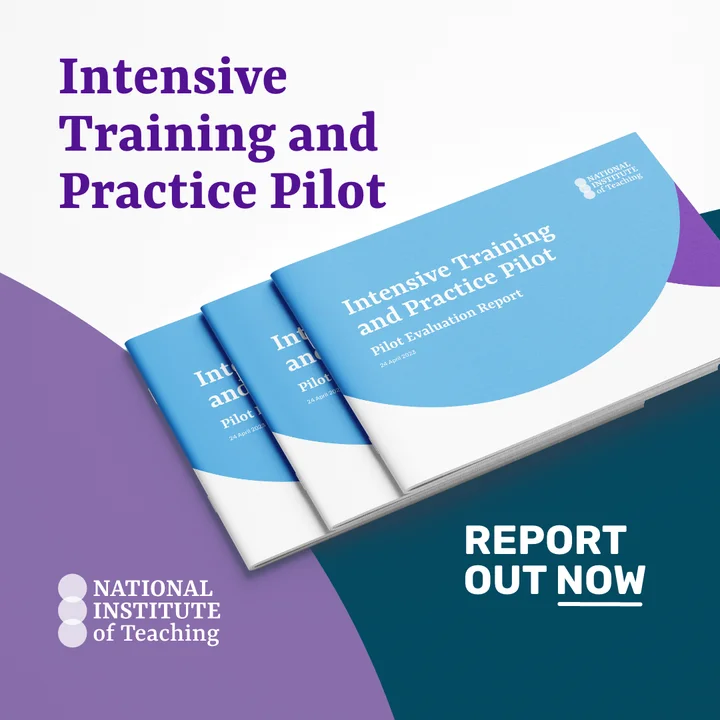Intensive Training and Practice (ITAP)
Offer intensive training and practice
Another way that schools can get involved in ITT is through supporting intensive training and practice. This is a new curriculum element of all ITT courses leading to QTS from September 2024. It involves:
- an intensive focus on theoretical learning for an area of teaching
- putting this theoretical learning into practice immediately
- getting expert, focused feedback on the practice
An accredited ITT provider will design and deliver intensive training and practice. However, some elements of intensive training and practice will need to take place in a school environment, such as live classroom practice.
Intensive training and practice is not a part of the school placement. Schools offering ITT placements may also decide to support practice elements of the intensive training and practice. However, schools do not have to offer ITT placements to be involved in intensive training and practice, and some schools have expertise that would make them particularly well-placed to support delivery of intensive training and practice.
To get involved in intensive training and practice, contact us tshub@sfet.org.uk
Department for Education guidance states:
Intensive Training and Practice should consist of delivery of 3 to 5 carefully selected pivotal or foundational aspects of the planned training curriculum. Many of these are likely to relate to areas of the CCF, but it will be for providers to exercise their judgement about which areas will be most appropriate for their training curriculum.
During Intensive Training and Practice, providers should ensure trainees are given the opportunity to intensify the focus on these foundational aspects of the ITT curriculum; benefit from immediate and targeted feedback focused on improvement; and access appropriate expert support.

Intensive Training and Practice is not a school placement and therefore does not all have to take place in a school. Many elements of the Intensive Training and Practice can be held in the training centre or virtually, e.g., recorded lesson observations. If components of Intensive Training and Practice take place in a trainee’s general placement school, this experience must be additional to the placement itself.
During Intensive Training and Practice, providers should ensure that trainees observe and reflect upon expert practice in specific aspects of the trainee curriculum. They should be supported to understand exactly what it is that makes such practice effective and to think about how it could be embedded in their own teaching. Trainees should then have the opportunity to apply what they have learnt through, for example, rehearsal and/or live practice, receiving constructive feedback from expert colleagues. The intention is to consolidate trainees’ understanding of how the research evidence underpinning the ITT curriculum should shape teaching practice. Use of Intensive Training and Practice should increase coherence between theory and practice.
Providers have the freedom to decide the best way to deliver Intensive Training and Practice, including how the days spent on this element are configured, providing that courses are designed to ensure the full entitlement of 4 weeks (20 days) for postgraduate courses and 6 weeks (30 days) for undergraduate courses. This element does not need to take place in one block and can be divided across the programme, however a provider sees fit.
For trainees on salaried routes, providers may find it more practical, or more appropriate to their curricula, to arrange Intensive Training and Practice to take place in their main school placement or in their second school placement. Overall, providers need to ensure that ITT courses are designed to provide trainees on post-graduate courses with 120 days of school placement across two schools, and that a distinct 4-week (20 days) Intensive Training and Practice element occurs in addition to those 120 days.
DfE Policy Paper Intensive training and practice

The DfE Policy Paper Intensive training and practice provides additional detail to help accredited initial teacher training (ITT) providers and their partner schools to understand the intensive training and practice (ITAP) element of ITT, and to incorporate it into their ITT curricula in a way that maximises the potential benefits to, and impact on, trainees’ practice and understanding.
Accredited ITT providers should read and use this document as a supplement to the content on ITAP contained within Initial teacher training: criteria and supporting advice – 2024 to 2025.
Intensive Training and Practice video resources to support ITT organisations
NASBTT has been working with the Department for Education (DfE) and led the creation of six new provider-friendly video resources on Intensive Training and Practice (ITaP).
These thematic videos captured ITT providers’ early exploration of different approaches to ITaP and are designed to help providers prepare for the expectations for September 2024.
The Chartered College of Teaching - Impact
Intensive training and practice (ITaP): Impact and possibilities for primary trainee teachers and schools
Impact and possibilities for primary trainee teachers and schools
This article outlines the impact and possibilities in supporting primary trainee teachers (across both three-to-seven and five-to-11 age phases) with their developing pedagogy, employing the new approach of intensive training and practice (ITaP) within initial teacher education (ITE). Given that ITaP heavily involves partner schools and will likely form part of the new Ofsted inspection framework, it is essential to carefully consider this different approach in supporting trainee assessment across the curriculum.
You can read the full article here.
NIoT Intensive Training and Practice Evaluation Report
 Starting from the 2024/25 academic year, all initial teacher training (ITT) programmes in England must include an Intensive Training and Practice (ITAP) component.
Starting from the 2024/25 academic year, all initial teacher training (ITT) programmes in England must include an Intensive Training and Practice (ITAP) component.
The National Institute of Teaching (NIoT) conceived and funded a pilot to try out different models of ITAP to inform future decision-making and delivery as the policy is rolled out. As part of this pilot, four established providers - Harris Federation, the Huddersfield Horizon SCITT, Liverpool Hope University and Star Teachers SCITT - designed and delivered models of ITAP to 318 postgraduate trainees and apprentices (referred to collectively as trainees in this report) during November and December 2022.
To support comparisons of different models and allow the evaluation to explore the implications of different design and implementation choices, all four models focused on the topic of questioning.
The four models were developed using a participatory approach and with reference to a five-element framework developed by NIoT and informed by the work of Pam Grossman. They all included a mixture of centre- and school-based activities to:
• Introduce: support trainees’ learning about the theory of teaching and learning
• Analyse: support trainees to analyse expert teaching
• Prepare: provide opportunities for trainees to use approximations to practice and get feedback
• Enact: support trainees to apply their learning in the classroom
• Assess: monitor trainees’ knowledge and skills
You can read the full research report here.
NIoT Assessing the Impact of Virtual School Visits in Initial Teacher Education
This document is for schools and initial teacher educatio n (ITE) providers. It describes the National Institute of Teaching (NIoT)’s evaluation of virtual versus in-person school experience visits as part of Intensive Training and Practice (ITaP). It offers insights into the delivery of both modalities, with recommendations for scaling ITaP through effective hybrid approaches.
n (ITE) providers. It describes the National Institute of Teaching (NIoT)’s evaluation of virtual versus in-person school experience visits as part of Intensive Training and Practice (ITaP). It offers insights into the delivery of both modalities, with recommendations for scaling ITaP through effective hybrid approaches.
The new Quality Requirements for ITE providers were published in 2021 and will come into force in the 2024/25 academic year (DfE, 2021); the National Institute of Teaching has been delivering ITE according to these new requirements since 2023, including ITaP. ITaP is designed to provide teacher trainees with focused, intensive, training on specific foundational aspects of teaching, aiming to more effectively integrate theory and practice (DfE, 2024). These foundational aspects can include effective questioning, scaffolding techniques, and ways to ensure high-quality
inclusive teaching for all pupils. Unlike school placements, which offer a broad exposure to various teaching practices within a specific practical context, ITaP seeks to promote mastery of these essential skills through targeted observation and deconstruction of expert practice, hands-on experience with immediate feedback, and expert guidance, with an emphasis on connecting theory to practice (DfE, 2024).
You can read the full research report here.
Research by the National Institute of Teaching
The National Institute of Teaching has published the findings of an important new study evaluating Intensive Training and Practice.
Calum Davey, Executive Director of Research and Best Practice at the NIoT, said:
“We want to share what we learned in the hope of being useful, by providing real-world examples of ITAP and offering considerations we hope to save ITT providers and schools time, money, and effort, and contribute to more effective ITAP designs.”
Read the full report here with a useful summary here.






